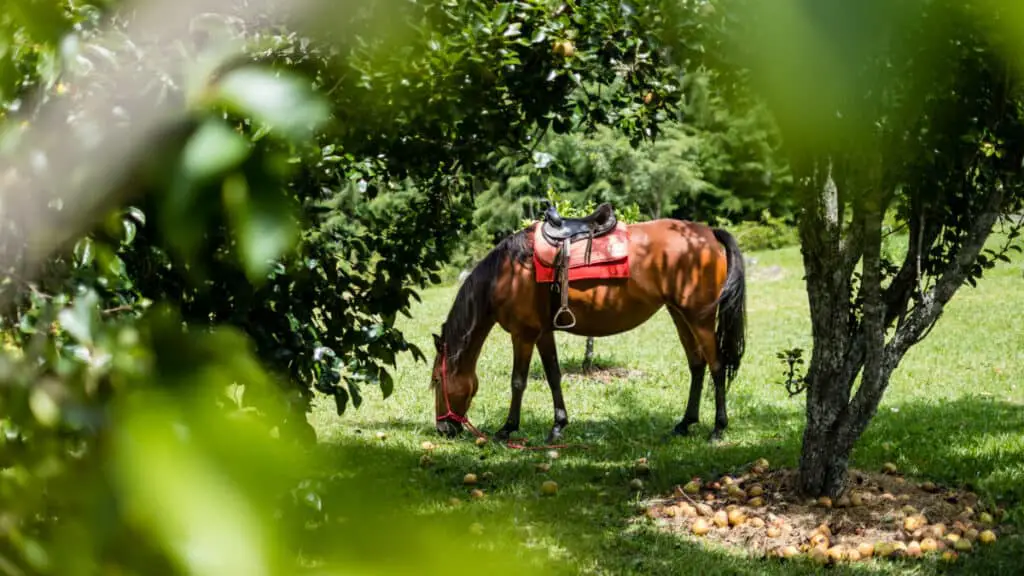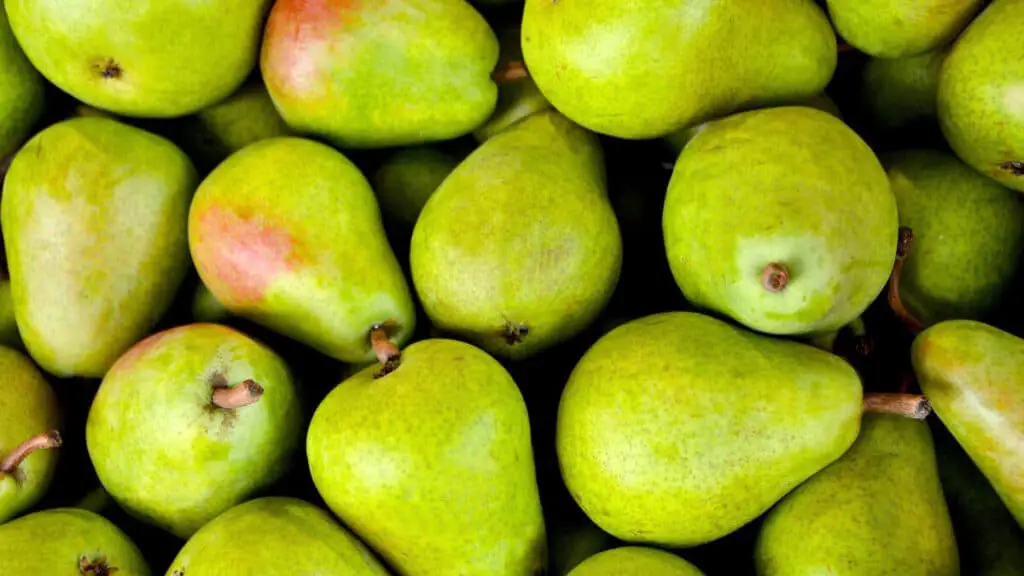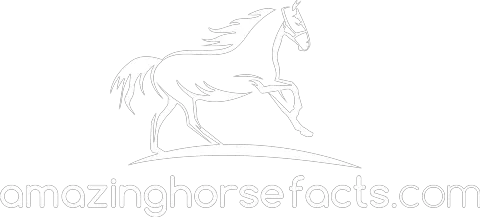Skip To Section
Can Horses Eat Pears?
Yes, horses can eat pears, both raw and cooked. They should be eaten in moderation as occasional treats. Make sure pear stalks and seeds are removed as these contain small quantities of a source of the poisonous compound cyanide. Chop the pear into small pieces for ease of eating and to avoid the risk of choking.

Giving treats is a great way to reinforce training, demonstrate affection, and build a strong bond with your horse. Natural and delicious, fruits can be a good treat option if chosen wisely.
If you’ve been wondering what treats to feed to your horse, and pears are amongst your options, then this is the guide for you.
Read on to find out more about how to prepare pears for your horse, how often they should be given, what to avoid, and a lot of other useful information.
Benefits
Pears taste good and are safe for horses to eat. They are full of natural sugars and nutrients, soft in texture, and easily digestible. Being grown and sold widely makes pears cheap and easy for owners to buy, and they are also easy to prepare.
Looking across the nutritional spectrum, pears are generally rich in vitamins (including vitamins B2, C, and E), minerals (especially potassium), and fibre to support overall horse health.
Antioxidant vitamins C and E promote a healthy immune system, helping the horse fight off disease. Vitamin B2, also called riboflavin, supports growth and is vital for converting food to energy.
The soluble fibre pectin helps to keep the horse’s digestive system in good order, slowing down digestion to better absorb nutrients, stopping stomach acid levels from going too high, and reducing the chance of sores occurring in a horse’s stomach.
All in all, pears are a superior horse treat to sugar lumps and processed foods. Given in moderation as part of a well-balanced diet, they will enhance horse health.
Risks
Pears can be a dangerous food for horses if prepared incorrectly or given to an animal too often.
For example, pears given whole or in large chunks could cause a horse to choke, potentially a serious medical condition in horses. Even when horses manage to cough up a food blockage they may subsequently develop pneumonia, a lung infection that could cause serious illness and death.
If pears are served without removing seeds and stalk, a horse will be consuming tiny amounts of a source of cyanide, a poisonous compound. While one or two pears are unlikely to do immediate damage, a large quantity of pears or frequent feeding with pears could be harmful or even lethal.
You should also think about your individual horse’s health before giving them pears or other fruits. There are some equine diseases and medical issues which would make eating pears a bad idea.
While diabetes isn’t as common in horses as humans, insulin resistance issues can occur. If you already know that this is a problem for your horse, pears will not be a good treat option and you should choose foods that are lower in sugar.
For example, horses that suffer from a disorder called hyperkalemic periodic paralysis (HYPP) require a low-potassium diet. They should not be given pears, which are a good source of potassium.
Can Horses Eat Raw Pears?
Yes, horses can eat raw pears as long as they are correctly prepared, in edible chunks, and with seeds and stalks removed.
Remember that horses are non-ruminant herbivores and raw plant foods are their normal diet. Horses are capable of digesting quite a wide range of foods including vegetables and fruits such as pears.
The horse gastrointestinal tract consists of the mouth, esophagus, stomach, small intestine, and the highly developed large intestine composed of the caecum, large colon, small colon, and rectum. It does not have multiple stomachs like cattle.
Bear in mind that your horse’s stomach is not very large relative to its size. In fact, horses have stomachs of the smallest volume relative to body size amongst all domestic animals! With a capacity of only two to four gallons, overfeeding definitely needs to be avoided.
Veterinary experts recommend giving your horse smaller meals more frequently rather than larger meals less often. Stick to a regular balanced diet with a feeding program based on high-quality forage. Any dietary changes should be implemented gradually, in line with vet advice where relevant. Treat foods like pears should only ever be given in moderation.
Can Horses Eat Cooked Pears?
Yes. Cooked pears are safe for your horse and they can eat them, but it is best for horse health that no sugar is added. Cooked pears should also be allowed to cool to a comfortable temperature to avoid burning the horse’s mouth.
Being even softer than raw pears, cooked pears require less chewing and can be a good option for horses with tooth or jaw problems.
Can They Eat Canned Pears?
Yes. Horses can eat canned pears but you should read the ingredients on the tin first and think carefully about feeding your animal anything with added sugar, syrup, preservatives, or other additives.
Fresh pears have a sweet taste due to naturally occurring sugars. Adding further sugar is unnecessary and probably of no benefit to your horse.
Can Horses Eat Pear Cores?
No, horses should not eat pear cores for several reasons. The cores are tougher and more fibrous than the rest of the pear, making them a greater choking hazard.
In horses, the term “choke” actually refers to a blockage of the oesophagus, as opposed to a blockage of the trachea in human choking.
If you observe a green frothy discharge from the nostrils or your horse is holding its head outstretched, looking anxious and coughing, it may be choking. While many cases of choke resolve alone, you should seek quick medical assistance if you are concerned.
The principle complication when horses choke is aspiration pneumonia, which occurs when saliva and food backing up the oesophagus is gets accidentally inhaled into the trachea and the lungs. Even a small amount of food or saliva can cause an infection which could develop into severe pneumonia, with a fatality rate of up to 25%.
It is also in the cores that you find the seeds, these being the parts that contain a source of the poison cyanide. Don’t worry if your horse has eaten a single pear core by accident but don’t let this be a regular occurrence and be more careful in future.
When feeding pears to your horse, do remove the cores.
Can Horses Eat Pear Seeds?
No, horses should never eat pear seeds. These contain a precursor of the poison cyanide and if eaten regularly or in quantity, they could in theory poison a horse, causing serious illness or death. While eating a few seeds is unlikely to cause an issue, it is best to keep your horse away from pear seeds and any other plants which contain sources of cyanide.
In common with related fruits such as apples, pear seeds contain amygdalin, a cyanogenic glycoside consisting of cyanide and sugar. When amygdalin is metabolized in the digestive system, it degrades into the highly poisonous chemical hydrogen cyanide (chemical formula HCN).
Cyanide is also known as prussic acid or hydrocyanic acid and is a fast-acting poison that stops oxygen from being transported to the body’s cells.
In acute cyanide poisoning, symptoms occur 15 mins to two hours after consumption of the toxic substance and can progress rapidly from excitement and fast breathing to seizures and death by respiratory failure.
Chronic cyanide poisoning can develop from an accumulation of smaller intakes over time. Wide-ranging symptoms include hypothyroidism, loss of coordination, limb paralysis, and kidney infection, eventually leading to death.
If you suspect your horse may be suffering from cyanide poisoning, you should seek medical help from a vet immediately.
Can Horses Eat Whole Pears?
While horses can eat whole pears, it is better to serve them cored and chopped. This reduces the risk of a horse choking on large chunks or the fibrous core and prevents the intake of pear seeds which contain a source of cyanide poison.
In general, remove the pit or core and remove the stem. Discard both the stalk and seeds before feeding pears to a horse.

How Many Pears Can I Give My Horse?
Pears should be a treat for horses, given in moderation alongside a balanced regular diet. One pear each day may be a reasonable amount but this will depend on the size, preferences, and usual diet of your horse.
It is important that horses have a regular and predictable diet without sudden changes or overfeeding, in order to maintain the normal function of their digestive systems. If too many pears or other treats are given, this can upset a horse’s digestion leading to discomfort and pain.
Are Pears Good For Horses?
Yes. Pears are nutritious and a good source of vitamins, minerals, fibre, and carbohydrate. Eating occasionally chopped pears is good for horses.
Can Horses Eat Asian Pears?
Yes, horses can eat many varieties of pears including Asian Pears. Do note that Asian Pears do not soften in the same way as many other pears as they ripen. It is, therefore, more important that they are sensibly chopped before feeding them to your horse in order to avoid choking risks.
Can Horses Eat Bradford Pears?
No, horses cannot eat Bradford pears, and nor should humans, dogs, and many other creatures. Also known as Pyrus calleryana or Callery pear, the fruit of this tree is apparently poisonous to a number of animals.
While individual seeds of the Bradford pear are not any more toxic than other types of pear seed, the ratio of seed to pulp is particularly high in these fruits. It is, therefore, easier to consume enough seeds to cause poisoning than with other pears.
Do not keep horses in the same area as Bradford pear trees and consider removing these trees if your horse will need to be permanently housed in the vicinity.
Bradford pears are considered an invasive species in several US states. Given the bad smell of the tree’s blossom and the weakness of its dense branches, by removing a tree you may be doing both yourself and the state a favor…
How To Serve
Ripe pears are often preferred by horses since they will be both softer and sweeter, making them tasty to eat and easy to digest. Before feeding a pear to your horse, first, remove the stem and seeds. Then cut the pear into manageable chunks to avoid any risks of choking.
Recipe Ideas
Some owners bake their own pear horse treats using tasty horse-friendly ingredients. Here are a few ideas you might want to try yourself…
Pear And Oat Bakes
Mix together 1.5 cups of oats with 1 cup of water, and 2-4 chopped cooked pears, depending on size. (NB Some recipes add sugar but we don’t recommend this.) Heat the mixture in the microwave for around four minutes until a thicker consistency is reached, stirring halfway through.
Then spoon the mixture into muffin pans and bake at 350°F for around 15 minutes until cooked. Once cooled, you can feed in moderation to your horse.
Baked Apple And Pear
Chop equal amounts of cored apple and pear onto an oven tray and bake at 400°F until soft. Allow to cool and then feed to your horse. This recipe will be a particularly good treat for horses with chewing problems.
Conclusion
Overall, pears are a great treat for many horses.
But remember that while horses can eat pears, and most horses enjoy them, this doesn’t mean that every horse will like them. Like human beings, individual horses can have different tastes in foods. Some horses will prefer other fruits to pears, or would rather snack on vegetables like carrots and swedes.
If you’d like to learn more about what fruits and other foods horses can safely enjoy then take a look at Amazing Horse Facts where you can read about all this and more.
Related Posts
- Can horses eat apples?
- Can horses eat avocados?
- Can horses eat bananas?
- Can horses eat blueberries?
- Can horses eat grapes?
- Can horses eat oranges?
- Can horses eat peaches?
- Can horses eat strawberries?
- Can horses eat watermelon?
- What do horses eat?
